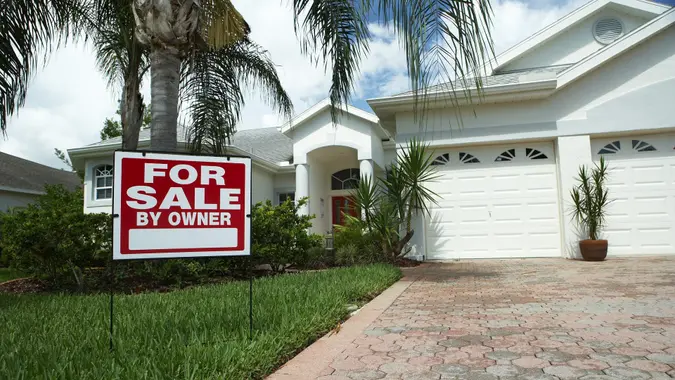How To Avoid Paying Taxes When Selling Your Home

Commitment to Our Readers
GOBankingRates' editorial team is committed to bringing you unbiased reviews and information. We use data-driven methodologies to evaluate financial products and services - our reviews and ratings are not influenced by advertisers. You can read more about our editorial guidelines and our products and services review methodology.

20 Years
Helping You Live Richer

Reviewed
by Experts

Trusted by
Millions of Readers
One of the best financial investments you can make is the house you live in or rent out. Given soaring home values over the last decade, it’s not uncommon for homeowners in 2025 to see hundreds of thousands of dollars in profit just by selling their homes. The downside is, you might get stuck with a big tax bill when you sell your home — especially if it’s an investment property instead of the house you live in.
What Taxes Do You Pay on Home Sales?
The IRS and state tax agencies consider your home a capital asset, which makes avoiding a capital gains tax a bit more complicated. This means you might owe capital gains taxes on the profit from the home sale, or when reinvesting the sale of your home. Your profit is the positive difference between the sales price and the purchase price you paid when you bought the home, plus adjustments such as closing costs and realtor commissions.
There are ways to avoid these taxes, however. The one thing you need to keep in mind is that there are big differences between selling a home you live in as opposed to selling one that you either rent out or have held as an investment.
Taxes You Can Avoid When Selling Your Primary Home
A home is considered your principal residence when you’ve lived in it for at least two of the past five years. Fortunately, you can sell your primary residence and still avoid paying capital gains.
When you sell, you can be exempt and exclude up to $250,000 if you are single or up to $500,000 for married couples filing jointly. If you lived in the home for a total of two of the five years before you sell, that means up to $250,000 of profit is tax-free (or up to $500,000 for married couples). Keep in mind that you can file for this exemption once every two years, so it won’t work for home flipping with quick turnover.
If your profit exceeds the $250,000 or $500,000 limit, the excess is typically reported as a capital gain on Schedule D for your tax return to avoid tax liabilities. You can add your cost basis and costs of any maintenance or improvements that you made to the home to the $250,000 gain from the sale if single or $500,000 if you file a joint return.
Other Ways To Avoid Taxes
If you do have to pay capital gains taxes on real estate, they are broken down into short- and long-term capital gains taxes. Sorting through all this can be complicated, so you’ll want to contact a tax expert to help guide you through it. For more information, visit the IRS website.
In addition to ensuring that you meet the two-year requirement, here are some other ways you can avoid paying taxes on the sale of your home:
- Military relocation: If you’re a member of the U.S. military and are forced to move for a new assignment, you can get an exemption from the “two in five” requirement. To qualify, you must be relocated to a duty station at least 50 miles from your home or reside in government housing under government orders for more than 90 days or an indefinite period, according to Finance Buzz.
- 1031 exchange: Also known as a “like kind” exchange, this rule lets you exchange one investment property for another without recognizing the gain at the time of the exchange, according to Robin Sansone, a CPA and partner at Georgia-based Rhodes, Young, Black & Duncan. “However, you will want to work closely with your accountant to structure the exchange properly to avoid tax,” Sansone told the HomeLight website. For more information, consult the IRS’s Like-Kind Exchanges page.
- Research exceptions: If you don’t meet the “two in five” eligibility rule, you might qualify for an exception for reasons related to work, health, unforeseeable events and other circumstances. Refer to IRS Publication 523 to learn more.
It’s also good to know that if you acquire ownership of your home as part of a divorce settlement, you can count the time the place was owned by your former spouse as time you owned the home for purposes of passing the two-out-of-five-years ownership test (but not the residency test). This is an important factor in reporting the sale profits or other short-term capital gains.
Even if you can’t avoid taxes altogether, you can reduce them by deducting the cost of capital improvements. To qualify, the capital improvement must meet various criteria, according to HomeLight. These include increasing the value of the property, being permanently affixed to the property or serving as a permanent installation/improvement, such as an in-ground pool.
Another option is to make an installment sale in which you let the buyer break the purchase into installments over time. Doing so lets the seller spread out tax gains over multiple tax years. By breaking the sale into multiple payments over several years, you can reduce the tax impact.
Caitlyn Moorhead contributed to the reporting for this article.
 Written by
Written by  Edited by
Edited by 

























